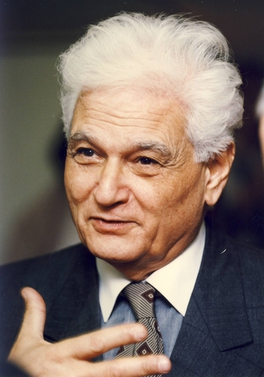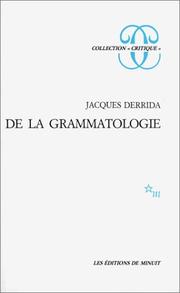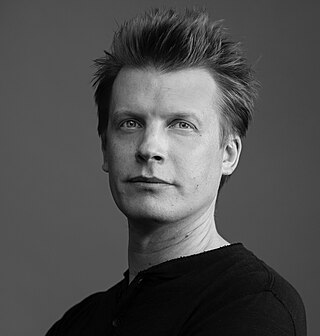Related Research Articles
Deconstruction is any of a loosely-defined set of approaches to understanding the relationship between text and meaning. The concept of deconstruction was introduced by the philosopher Jacques Derrida, who described it as a turn away from Platonism's ideas of "true" forms and essences which take precedence over appearances. Since the 1980s, these proposals of language's fluidity instead of being ideally static and discernible have inspired a range of studies in the humanities, including the disciplines of law, anthropology, historiography, linguistics, sociolinguistics, psychoanalysis, LGBT studies, and feminism. Deconstruction also inspired deconstructivism in architecture and remains important within art, music, and literary criticism.

Jacques Derrida was an Algerian-born French philosopher. He developed the philosophy of deconstruction, which he utilized in numerous texts, and which was developed through close readings of the linguistics of Ferdinand de Saussure and Husserlian and Heideggerian phenomenology. He is one of the major figures associated with post-structuralism and postmodern philosophy although he distanced himself from post-structuralism and disowned the word "postmodernity".

Hélène Cixous is a French writer, playwright and literary critic. During her academic career, she was primarily associated with the Centre universitaire de Vincennes, which she co-founded in 1969 and where she created the first centre of women's studies at a European university. Known for her experimental writing style and great versatility as a writer and thinker, she has written more than seventy books dealing with multiple genres: theater, literary and feminist theory, art criticism, autobiography and poetic fiction.
French literature generally speaking, is literature written in the French language, particularly by citizens of France; it may also refer to literature written by people living in France who speak traditional languages of France other than French. Literature written in the French language by citizens of other nations such as Belgium, Switzerland, Canada, Senegal, Tunisia, Algeria, Morocco, etc. is referred to as Francophone literature.
Paul de Man, born Paul Adolph Michel Deman, was a Belgian-born literary critic and literary theorist. At the time of his death, de Man was one of the most prominent literary critics in the United States—known particularly for his importation of German and French philosophical approaches into Anglo-American literary studies and critical theory. Along with Jacques Derrida, he was part of an influential critical movement that went beyond traditional interpretation of literary texts to reflect on the epistemological difficulties inherent in any textual, literary, or critical activity. This approach aroused considerable opposition, which de Man attributed to "resistance" inherent in the difficult enterprise of literary interpretation itself.
The Yale school is a colloquial name for an influential group of literary critics, theorists, and philosophers of literature that were influenced by Jacques Derrida's philosophy of deconstruction. Many of the theorists were affiliated with Yale University in the late 1970s, although a number of the theorists – including Derrida himself – subsequently moved to or became affiliated with the University of California, Irvine.

Joseph Hillis Miller Jr. was an American literary critic and scholar who advanced theories of literary deconstruction. He was part of the Yale School along with scholars including Paul de Man, Jacques Derrida, and Geoffrey Hartman, who advocated deconstruction as an analytical means by which the relationship between literary text and the associated meaning could be analyzed. Through his career, Miller was associated with the Johns Hopkins University, Yale University, and University of California, Irvine, and wrote over 50 books studying a wide range of American and British literature using principles of deconstruction.
Geoffrey Bennington is Asa Griggs Candler Professor of French and Professor of Comparative Literature at Emory University in Georgia, United States, and Professor of Philosophy at the European Graduate School in Saas-Fee, Switzerland, as well as a member of the International College of Philosophy in Paris. He is a literary critic and philosopher, best known as an expert on deconstruction and the works of Jacques Derrida and Jean-François Lyotard. Bennington has translated many of Derrida's works into English.

Julie; or, The New Heloise, originally entitled Lettres de Deux Amans, Habitans d'une petite Ville au pied des Alpes, is an epistolary novel by Jean-Jacques Rousseau, published in 1761 by Marc-Michel Rey in Amsterdam.
Barbara Ellen Johnson was an American literary critic and translator, born in Boston. She was a Professor of English and Comparative Literature and the Fredric Wertham Professor of Law and Psychiatry in Society at Harvard University. Her scholarship incorporated a variety of structuralist and poststructuralist perspectives—including deconstruction, Lacanian psychoanalysis, and feminist theory—into a critical, interdisciplinary study of literature. As a scholar, teacher, and translator, Johnson helped make the theories of French philosopher Jacques Derrida accessible to English-speaking audiences in the United States at a time when they had just begun to gain recognition in France. Accordingly, she is often associated with the "Yale School" of academic literary criticism.

Sarah Kofman was a French philosopher.
Imre Salusinszky is an Australian journalist, political adviser and English literature academic who is currently media adviser to former Australian Government Minister for Communications, Urban Infrastructure, Cities and the Arts, Paul Fletcher.

Of Grammatology is a 1967 book by the French philosopher Jacques Derrida. The book, originating the idea of deconstruction, proposes that throughout continental philosophy, especially as philosophers engaged with linguistic and semiotic ideas, writing has been erroneously considered as derivative from speech, making it a "fall" from the real "full presence" of speech and the independent act of writing.
Peggy Kamuf is the Marion Frances Chevalier Professor of French and Comparative Literature at the University of Southern California. She is one of the primary English translators of the works of Jacques Derrida. She received the American Comparative Literature Association's 2006 René Wellek Prize for her 2005 work Book of Addresses.

Naomi Schor was an American literary critic and theorist. A pioneer of feminist theory for her generation, she is regarded as one of the foremost scholars of French literature and critical theory of her time. Naomi's younger sister is the artist and writer Mira Schor.

Martin Hägglund is a Swedish philosopher and scholar of modernist literature. He is the Birgit Baldwin Professor of Humanities at Yale University. He is also a member of the Harvard Society of Fellows, serving as a Junior Fellow from 2009 to 2012. Hägglund is the author of This Life: Secular Faith and Spiritual Freedom (2019), Dying for Time: Proust, Woolf, Nabokov (2012), Radical Atheism: Derrida and the Time of Life (2008), and Kronofobi: Essäer om tid och ändlighet. He was awarded a Guggenheim Fellowship in 2018 and won the René Wellek Prize in 2020.
Martin McQuillan is a Scottish-born literary theorist, cultural critic and journalist currently employed at Edge Hill University. He was Professor of Literary Theory and Cultural Analysis and Dean of the Faculty of Arts and Social Sciences at Kingston University, London, where he was also Co-Director of The London Graduate School, and was Deputy Vice-Chancellor of Research, Business and Innovation between 2015 and 2017. He was previously Pro-Dean of Research (2005–09) for the Faculty of Performance, Visual Arts and Communications at the University of Leeds, where he was also Head of the School of Fine Art, History of Art and Cultural Studies (2001–2005). Before that he was a lecturer in English at Staffordshire University (1997–2000).

Marian Elizabeth Hobson Jeanneret, is a British scholar of French philosophy, and culture. From 1992 to 2005, she was Professor of French at Queen Mary, University of London. She had previously taught at the University of Warwick, the University of Geneva, and the University of Cambridge. In 1977, she became the first woman to be elected a Fellow of Trinity College, Cambridge.
Béatrice Didier is a French literary critic.
References
- 1 2 3 4 "Christie McDonald". rll-faculty.fas.harvard.edu. Retrieved September 26, 2020.
- ↑ "Christie McDonald". complit.fas.harvard.edu. Retrieved September 26, 2020.
- ↑ University, Harvard (September 26, 2020). "Christie McDonald". Center for European Studies at Harvard University. Retrieved September 26, 2020.
- ↑ "Christie McDonald". sites.fas.harvard.edu. Retrieved December 8, 2020.
- ↑ "Mcdonald, Christie | Encyclopedia.com". www.encyclopedia.com. Retrieved October 8, 2020.
- ↑ "Romance Dept. Tenures New Prof".
- ↑ "Mather Faculty Deans to Retire in June | News | The Harvard Crimson". www.thecrimson.com. Retrieved October 8, 2020.
- ↑ See Note 1, Christie McDonald, « Notes sur l’entre-deux : de la biographie à l’autobiographie des femmes », dans : Jacques Neefs éd., Le Bonheur de la littérature. Variations critiques pour Béatrice Didier. Paris cedex 14, Presses Universitaires de France, « Hors collection », 2005, p. 339-349. DOI : 10.3917/puf.neef.2005.01.0339. URL : https://www-cairn-info.ezp-prod1.hul.harvard.edu/le-bonheur-de-la-litterature--9782130523031-page-339.htm
- ↑ "2019". INSTITUTE OF FRENCH CULTURAL STUDIES. Retrieved December 8, 2020.
- ↑ Brown, Marshall (1999). Eighteenth-century Literary History: An MLQ Reader. Durham: [Duke University Press]. p. 270. ISBN 0822322676.
- ↑ "Fellows Directory | The Royal Society of Canada". rsc-src.ca. Retrieved December 9, 2020.
- ↑ "Lettre de l'ambassade de France, dated April 6, 2018". accounts.google.com. Retrieved December 8, 2020.
- ↑ "Rousseau and Freedom, Christie McDonald". sites.fas.harvard.edu. Retrieved December 9, 2020.
- ↑ "Femmes et littérature, Christie McDonald". sites.fas.harvard.edu. Retrieved December 9, 2020.
- ↑ "See "3. Feminist Deconstruction" in Deconstruction | Internet Encyclopedia of Philosophy" . Retrieved December 9, 2020.
- ↑ "Proust and the Arts". sites.fas.harvard.edu. Retrieved December 11, 2020.
- ↑ "Images of Congo". sites.fas.harvard.edu. Retrieved December 11, 2020.
- ↑ "Painting My World". sites.fas.harvard.edu. Retrieved December 11, 2020.
- ↑ "The Life and Art of Anne Eisner". sites.fas.harvard.edu. Retrieved December 11, 2020.
- ↑ "Christie McDonald, publications". sites.fas.harvard.edu. Retrieved December 18, 2020.